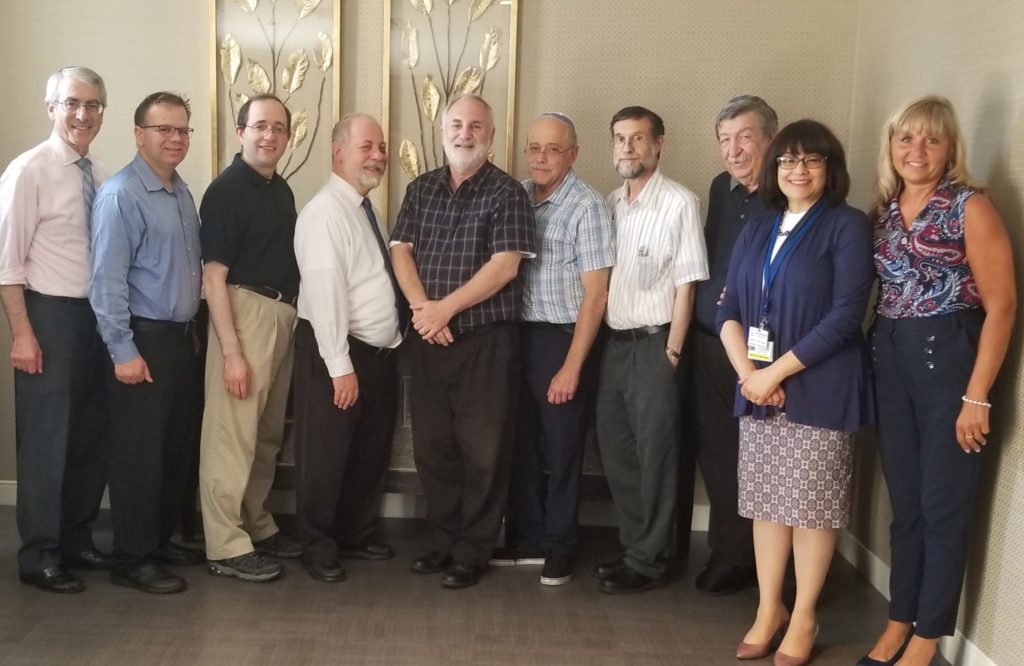UTJ’s Morashah Holds Annual Conferencex
 Morashah Rabbis with staff from the hosts of the Kallah, The Jewish Home for Rehabilitation and Nursing in Freehold, New Jersey
Morashah Rabbis with staff from the hosts of the Kallah, The Jewish Home for Rehabilitation and Nursing in Freehold, New Jersey
Morashah, the UTJ’s rabbinic fellowship held its annual Kallah (conference) on Monday through Wednesday August 19-21, 2019 in Freehold, New Jersey. The theme of the conference was halakhic methodology. The event was organized by Morashah Chairperson Rabbi Seth Gordon and by local coordinator (and past Chairperson) Rabbi Robert Pilavin.
Those who attended (or participated by phone) learned Torah, discussed Morashah business, reconnected with each other, and enjoyed good food and service. 11 colleagues were physically present (a few cancelled just before the Kallah due to illness and / or deaths in their families.) Three wives attended — Lynn Bressler, Marian Gordon, and Bonnie Sussman — and contributed.
Rabbi Gerry Sussman, Executive Director of the UTJ spoke about the state of the UTJ and Rabbi Noah Gradofsky reported on the progress of the UTJ’s website and social media including over 2,000 website visits, 500 “likes” for the UTJ Facebook Page, and more than 10 hours a month watched on the UTJ Youtube channel.
On Monday evening the Rabbis heard a comprehensive and detailed presentation on the role of halakhah (law) and minhagim (customs) when it comes to hevre Kadisha (burial of Jewish people) as well as the local rabbi’s role in that process.
On Tuesday, after Shaharit and breakfast, there was an intense day of learning devoted to the theme: p’sak (decisions of Jewish law) and halachic methodology.
Rabbi Seth Gordon’s opening session featured the issue of reciting blessings before doing a mitzvah with specific application to candle lighting and hand washing. Rabbi Gordon sought illustrate p’sak following the p’shat (plain meaning) of the Gemara and how the early and later rabbis understood the Gemara or supported mihagim with creative halachic rulings that deviated from the p’shat of the Gemara.
Rabbi Alan Yuter (from Israel) gave a scholarly (and humorous) presentation on theoretical methodologies citing various specifics. His remarks were to varied and detailed to be summarized here, but a paper based on his remarks will be published on UTJ Viewpoints shortly.
Rabbi Leonard Levy brought his scholarship to the issue of amirah l’goy (asking a non-Jew to violate Shabbat in certain situations) with specific reference to geonic literature as well as Rif (Rabbi Isaac Alfasi) and Rambam (Maimonides).
Rabbi Noah Gradofsky invited Morashah to consider the barayta which states that women may not read from the Torah as well as the various methodological assumptions that go in to determining how that baryta applies today. Specific reference was made to ITJ Reish metivta, Rabbi David Weiss Halivni and how he approached this issue.
In the evening, Rabbi Robert Pilavin went through the Jewish calendar raising and inviting comment on various holiday minhagim that have been challenged on halakhic grounds.
Through the many discussions, the theme of halakhic methodology was addressed in breadth and depth both regarding a number of specific issues as well as in general.
On Wednesday morning, Rabbi Steven Saks led a discussion of ideas for high holiday sermons.
Stay tuned to the UTJ Viewpoints page and/or the UTJ Facebook page for papers, videos, and audio recordings from the Kallah!